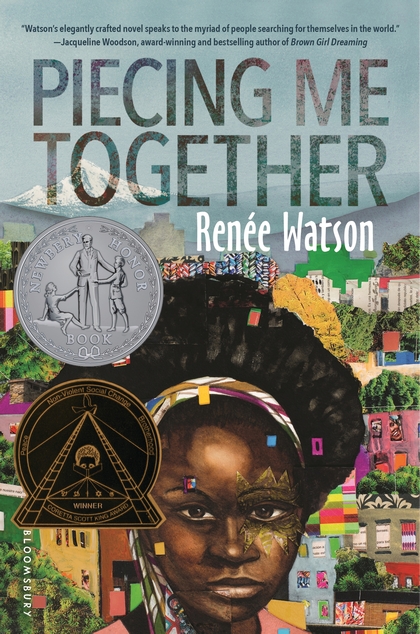Piecing Me Together
Written by Renée Watson
Bloomsbury Children’s Books, 2017, 264 pp.
ISBN: 978-1681191058
2018 Jane Addams Children’s Book Award
Honor Book, Books for Older Children
Readers meet astute, artistic, and authentic Jade as she traverses the multiple milieux of her teenage life. Living in a black, low-income neighborhood in Portland, Oregon, she buses across town to St. Francis, an exclusive and predominantly white, private prep school. There, as a scholarship recipient, Jade navigates the “opportunities” others have chosen to bestow upon her, and the slippery intersections of her racial, class, gender, and corporeal identities. As she laments, “girls like me, with coal skin and hula-hoop hips, whose mommas barely make enough money to keep food in the house, have to take opportunities every chance we get” (p. 6-7). Jade experiences alienation to the point of personal annihilation:
Sometimes it feels like I leave home a whole person, sent off with kisses from
Mom, who is hanging her every hope on my future. By the time I get home I feel
like my soul has been shattered into a million pieces…
And this makes me wonder if a black girl’s life is only about being stitched
together and coming undone, being stitched together and coming undone.
I wonder if there’s ever a way for a girl like me to feel whole. (pp.85-86)
Despite intense experiences of fragmentation, Jade proves herself as a maker of art and relationships. It is within the context of her varied relationships that readers experience the complexity of the threads that bind us and likewise pull us apart. Jade befriends Sam, a white girl also attending St. Francis on a scholarship, who lives in a working-poor neighborhood on Jade’s bus route. Sam is viscerally aware of economic hegemony but fails to acknowledge the small and large ways Jade faces racial oppression. Maxine, a well-healed African American St. Francis alum who is paired with Jade through the “Woman to Woman” mentorship program for “at risk” girls, understands racism but is oblivious to her own class condescension.
Jade is compelled to confront the forces of the fragmentation she and others experience that are engendered by inequitable opportunities at school, racial profiling, body-shaming, and charity that seeks to fix the needy. She also passionately fights injustice and strives to bring torn communities together. After Natasha Ramsey, a teen from a nearby suburb, is brutally beaten by the police, it is Jade who organizes an open-mic art benefit to pay her medical bills and to help the disparate neighborhood heal. Ultimately, Jade models how to interact with imperfect people and demonstrates how to transform oneself into someone who can build bridges in a world divided by racism and classism.
Renée Watson grew up in Portland and, as a reviewer who lives in Oregon, I can vouch for her authentic depiction of the city. Its reputation as a progressive place to live ignores both the legacy of racist housing policies and current displacement associated with recent gentrification. Nonetheless, Watson’s bold realism is tempered with hope in Piecing Me Together. Deservedly, her startling novel received honor citations from the Jane Addams and the Newbery Committees, as well as a 2018 Author Award from the Coretta Scott King Committee. An acclaimed writer, Watson is also an educator, member of the Council of Writers for the National Writing Project and We Need Diverse Books, and an advocate for the publication of other writers who enrich literature for young people through their diverse voices.
This contemporary and realistic novel will kindle extensive dialogue about the criteria for the Jane Addams Children’s Book Award. Other books that complement Piecing Me Together include Angie Thomas’ The Hate U Give (2017) and Karen English’s It All Comes Down to This (2017). An author study of Renée Watson would inspire writers in the secondary grades. In Watch Us Rise (2019), Watson and co-author Ellen Hagen sharpen the focus on advancing power and equality for women, and this seems a very timely pairing in the age of the #MeToo movement. In the story, high school juniors Chelsea and Jasmine use art to take a stand against gender inequality in their blog, “Write Like a Girl.” Featuring provocative poetry, prose and video clips, essays on culture, as well as articles on feminists and female artists, the blog goes viral. Not all the attention is positive, however. The young women writers are targeted by trolls and the school principal decides to shut the blog down; but Chelsea and Jasmine won’t be silenced! In her recent publication, Some Places More Than Others (2019), Watson illustrates for middle grade readers that understanding “self” and knowing one’s history are cornerstones to building one’s future. Her biographical article, “Black Like Me” (published in Rethinking Schools in 2014), a reflection on personal experiences from her youth, would powerfully complement each text. Together or separately, they invite purposeful reflection on oppressions caused by prejudice, racism and social injustice.
Chloë Hughes, Western Oregon University
WOW Review, Volume XII, Issue 2 by Worlds of Words is licensed under a Creative Commons Attribution-NonCommercial-ShareAlike 4.0 International License. Based on work at https://wowlit.org/on-line-publications/review/xii-2/

